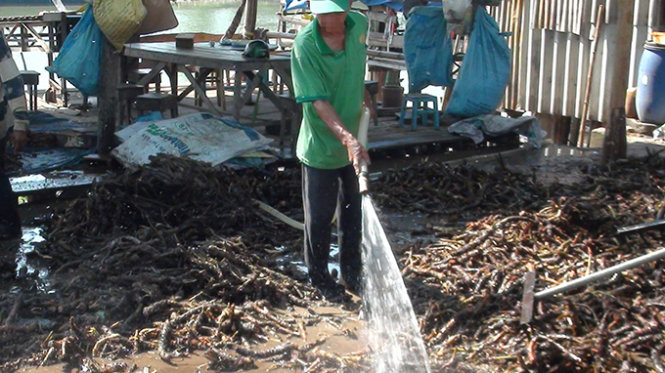A number of tourists have fallen prey to herbal “medicine” of unclear origin and quality which is widely sold at many scenic spots throughout the Mekong Delta region, including Phu Quoc Island, a paradise-like tourist attraction off the southern Vietnamese coast.
>> An audio version of the story is available here
In the past few years, a wide array of home-made, unverified herbal “medicines,” either in the form of pills, leaves, roots or potions, have been on sale at many relics and tourist attractions in many Mekong Delta provinces, including An Giang and Kien Giang.
Though the quality of the “medicine” may be unknown, it has successfully trapped a number of unsuspecting victims.
Maze of ‘medicines’
Leaves, roots, fruits and bark of many plant and herb varieties, which are casually packed and may or may not bear details of their origin, are advertised by peddlers to boast several medicinal properties and even work miracles on chronic illnesses.
Such packets, which bear the words “Than Duoc That Son” (That Son Elixir), are sold at the Cam and Sam Mountain Tourism Sites, located in Tinh Bien and Chau Doc Districts, respectively, in An Giang.
That Son, a mountainous area spanning the province’s Tri Ton and Tinh Bien Districts, has long been known as a reservoir of medicinal herbs.
Home-made medicine which is kept in gaudy packets or bottles with Cambodian words is also rampant at tourist attractions in those provinces bordering Cambodia.
Peddlers claim their wares can cure many diseases and boost users' sexual vigor and well-being.
Tourists buy into such claims, and many of them purchase up to dozens of kilograms of each product for their own use and to give to relatives and friends.
In Ha Tien District, located in Kien Giang Province, which is home to the gorgeous Ha Tien beach, peddlers are often seen pushing carts loaded with such medication along the streets or waiting for tourists in front of their hotels.
“I learned of the herbs’ medicinal properties on the Internet and feel tempted by the goods on sale here as they are quite cheap,” said Truong Hoa Thanh, a tourist from Ho Chi Minh City.
On Phu Quoc Island, a paradise-like island which covers 589.23 km² off Kien Giang, which draws crowds of domestic and international tourists every year, such herbs as “voi voi,” “van bay,” “huyet rong,” “ha thu o,” “bim bim,” “bi ky nam” and “xao tam phan” are also readily on sale.
Their packets have pieces of paper on which the producers’ addresses and phone numbers are casually printed.
As Tuoi Tre (Youth) newspaper reporters observed, several of the producers based in Ham Ninh Fishing Village on Phu Quoc do not strictly follow hygienic safety procedures.
After being picked from forests, the herbs, including their roots, are carelessly rinsed through, chopped into smaller chunks and dried along the streets or minced into fine powder and balled into round pills with bare hands.

Home-made medicine which is kept in gaudy packets or bottles with Cambodian words is rampant at tourist attractions in several Mekong Delta provinces. Photo: Tuoi Tre
Adverse effects
Many tourists lamented the harmful effects they have sustained from using such medicinal herbs.
Cao Thi May, who lives in Long Xuyen City in An Giang, has taken the herbs which she buys at a tourism complex on a regular basis to treat her rheumatism in the past few months.
She recently suffered a hypertension bout. Doctors told her that the herbs may contain corticoid-related substances, which are responsible for hazardous complications in the long term.
May said she has grown addicted to the herbs, feels aches all over, and is irritated without them.
Le Van Chi, from Dong Thap Province, bought five kilograms of “mat nhan” pills during a trip to Ha Tien.
The “miracle” pills gave him and his friends acute bouts of diarrhea and rashes the following days.
Bui Huu Hoa, from Can Tho City, groaned that during a recent trip to Phu Quoc, he bought a big sack of “xao tam phan” (a herb believed to boast valued medicinal properties) at considerably cheaper prices than those offered on the mainland.
He later found out that the herbs are fake.
Tran Quang Trung, chair of An Giang Province’s Alternative Medicine Association, told Tuoi Tre that herbs processed as medicine all go through exhaustive research and meet stringent quality standards.
“Many of the herbs on sale in recent times are not scientifically proved to have medicinal properties. Processors mostly concoct them based on word of mouth or personal experience, while sellers inflate their effects,” he noted.
Trung stressed that even if the herbs are scientifically tested to boast medicinal uses, they will be rendered useless or even have high risks of poisoning if processed and preserved improperly.
Pham Van Thoai, vice head of the Kien Giang Department of Health, acknowledged the rampancy of such herbal medicine despite their efforts to stall them.
He added his department will instruct local tourism offices and tourism complexes to take measures to stop locals from peddling such medicine and talk tourists out of buying them.
Like us on Facebook or follow us on Twitter to get the latest news about Vietnam!


















































